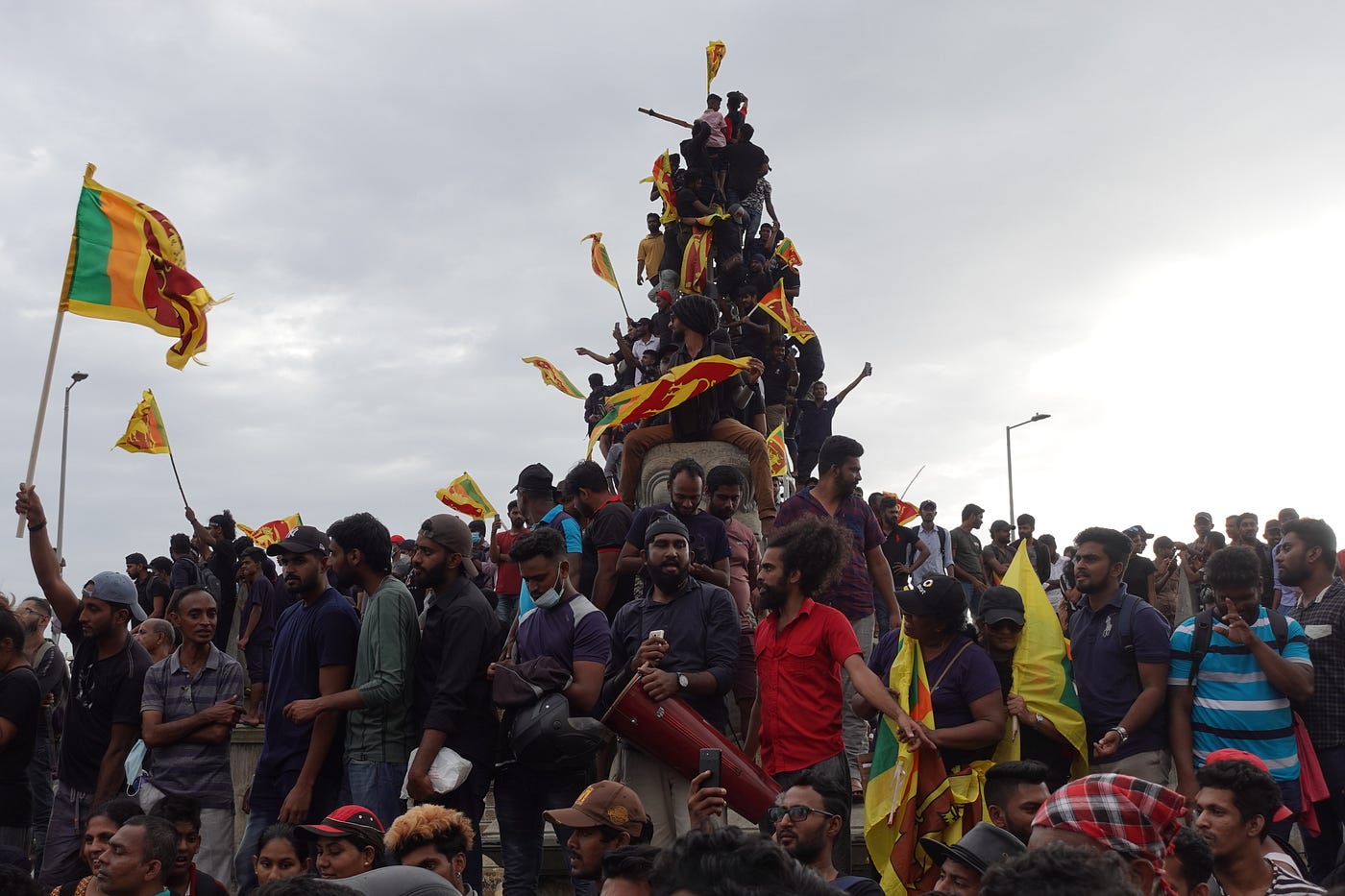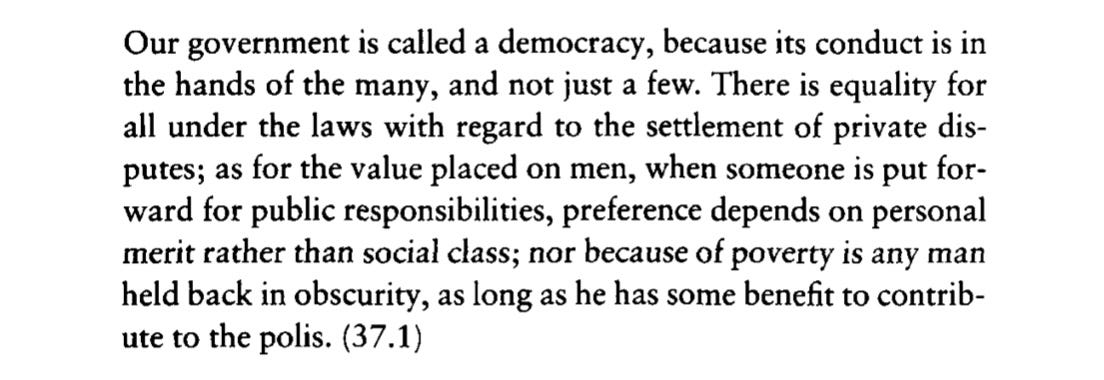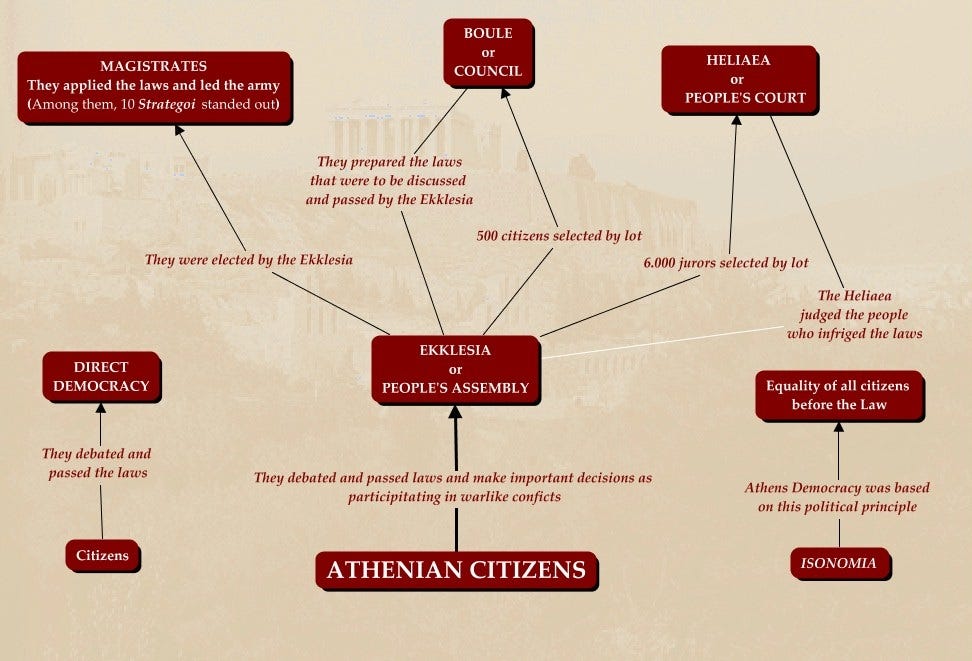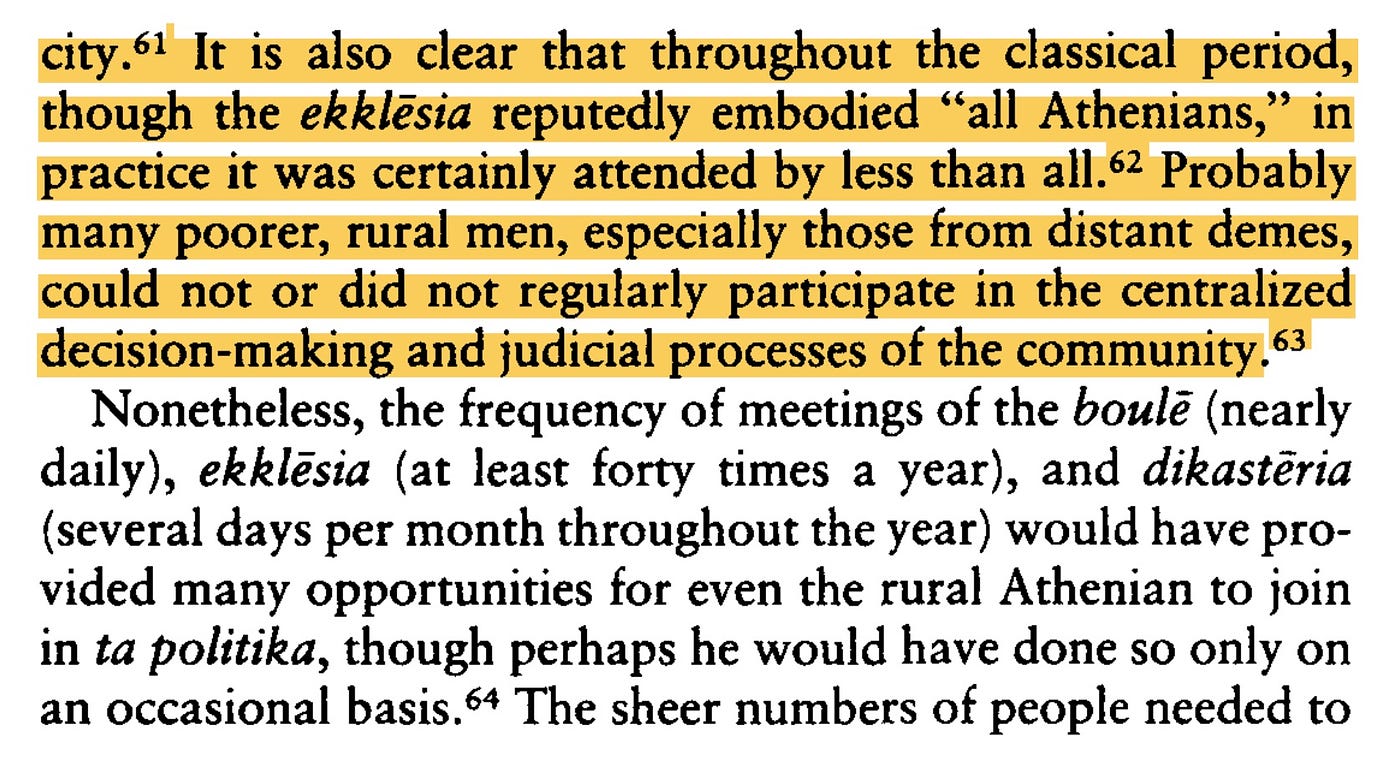How Protest Is A Democratic Institution

In ancient Athens, if you were a citizen you had every right to power yourself. Any citizen could just show up in the town square and govern themselves. Today we would call that a protest, and generally meet it with truncheons and teargas. But read a little history. People assembling and shouting is the most democratic institution there is.
A Disclaimer Because I’m About To Discuss Ancient GreeksPeople are quick to shun discussion of Greek democracy since they were slavers and sexists and hostile to migrants. But ‘liberal’ democracy was designed by slavers and sexists and people hostile to migrants so I see no reason to hold it in any higher regard. As to the fact that most people couldn't participate in Greek democracy, that's true, but citizenship is still a violently proscribed category today. The differences in cruelty are just a matter of degree, not kind, and in many ways, we're even more cruel.As to whether a technology meant for city-states scales to nations, that's an open question about democracy in general, not unique to any particular form.The modern, frankly religious, belief in representative democracy has really amputated our imagination. Democracy comes in many different forms. As liberal democracy completely breaks down we must - as I saw scrawled on a wall today - QUESTION EVERYTHING.
As Perikles put it:

Yet today, the conduct of modern democracies is in the hands of a few, usually an all-powerful President or Prime Minister, and a weak Parliament that generally follows along. People anoint these people through bribery festivals called elections, but we have no direct power.
The Greeks would call modern democracy an oligarchy (which wasn’t an insult, just a choice). We obviously wanted to preserve a class structure where a few rule the many. You can see that in the violent, classist, slaving places that ‘modern’ democracy came from (England, the US, France). They branded their system Democracy™️ for marketing and bombing purposes, but philosophically speaking it’s just the oligarchy of old.
To see how modern democracy is shit in org-chart form, behold this graphic of how the Athenians did it:

The Athenians had an Executive, a Legislative, and a Judiciary, but above all of them, the people directly governed. The supreme authority was a People’s Assembly, that any citizen could physically attend. They usually didn’t, but if shit got real, citizens surely attended. The result would look a lot like a protest in a town square, but they had actual power. As they should and—with great difficulty—as big protests still do.


In this way, a protest is not a rebellion against democratic institutions. It is the re-emergence of a buried democratic institution, the one that’s supposed to be supreme over all. People somehow instinctively assemble in town squares to take power over what is rightfully theirs. Athenians understood this and made the People’s Assembly an institution, whereas our ruling elites try to make it illegal. But people power persists, especially in times of great turmoil. It is the true source of power, as much as elites try to bury it under elections.
Today we have a perverted idea that democracy is elections, but the Athenians only used elections for the Executive. The Legislature was selected by lot (randomly among the citizens), as was the Judiciary.
The reason modern states can’t do this is supposed to be that it’s not feasible, you can’t have direct democracy among millions of people. But well, why not? And how do you explain the fact that we do? ‘People’s Assemblies’ have spontaneously assembled everywhere from Bolivia to South Korea to Sri Lanka to overthrow leaders and change policies. This is direct democracy in action, happening across millions of people.
We call protests something that happen outside of democratic institutions, but dig a little deeper, do a little archeology. Protestors are really just dusting off the old People’s Assembly, the most ancient and powerful democratic institution of all.
Today we also have the equally perverted idea that representative democracy is the only possible form—that we simply must be ruled by the few—but why? Why do we need a class of corrupt, increasingly hereditary political elites making decisions for us? Are they really smarter and less awful than a random person off the streets? Have we not somehow created a system that rewards the worst among us, and gives the ‘donor class’ a license to steal?
As you can see from Athens, they elected the Executive, but the Legislature and Judges were chosen by lot. They had a foundational principle that citizens could make the law and were equal in its administration, so they literally selected random people for those spots. Today people would say that ordinary people are too uneducated or poor to make these decisions, but that’s not democracy. As Aristotle said:
“Moreover, as an oligarchy is said to be a government of men of family, fortune, and education; so, on the contrary, a democracy is a government in the hands of men of no birth, indigent circumstances, and mechanical employments. (Politics: A Treatise on Government, Aristotle)
Think about what old Aris said, and then think about electoral democracy. Yeah, we vote, but it reproduces a government of men of family, fortune, and education. An oligarchy. That’s not an insult. Things just are what they are.
Note that Aristotle and the Greeks weren’t even pro-democracy per se, certainly not in the knee-jerk way people are now. Aristotle said:
“Some persons think that there is only one species both of democracy and oligarchy; but this is not true… all laws are, and ought to be, framed agreeable to the state that is to be governed by them, and not the state to the laws:”
Aristotle’s On Politics is a tour around the many different species of democracy in West Asia and North Africa and he was not judgemental. Some places wanted an aristocracy, and designed their institutions to preserve that. Some places wanted an oligarchy and that’s what they had. As A.D. Linday said in his introduction:
“When we come to Aristotle’s analysis of existing constitutions, we find that while he regards them as imperfect approximations to the ideal, he also thinks of them as the result of the struggle between classes. Democracy, he explains, is the government not of the many but of the poor; oligarchy a government not of the few but of the rich. And each class is thought of, not as trying to express an ideal, but as struggling to acquire power or maintain its position.”
Today we hold up representative (or liberal) democracy as the ideal, but that’s really an expression of class struggle. The rich and the ruling class keep you fighting about dumb shit while controlling the economy and military and all the important shit however they want. They rule as a rotating cast of increasingly hereditary oligarchs. As Caitlin Johnstone writes:
You may vote and debate freely on any issue which does not affect the functioning of the empire. When it comes to how money, weapons and resources move around the world, however, you suddenly find that your votes don’t matter and your position has no mainstream representation. They’ll let you argue until you’re blue in the face over whether or not you can have an abortion or whether minorities should have civil rights; they’ll even let you vote on it. But things like military expansionism and neoliberal globalization and deregulation are off limits.
The empire relies on false political dichotomies like Democrats vs Republicans to keep everyone fighting over issues which don’t affect the functioning of the empire so the machine can trudge onward uninterrupted by the local riff raff. That is the entire job of those parties.
What they have done is bury the diversity of democracy in mountains of bullshit, erected a corrupt system that entrenches their class, and told you to worship it as a secular religion. And people do. Americans and Europeans merrily cheer on wars for ‘democracy’ just as they cheered on wars for ‘Christendom’. Even colonized countries assemble this cargo cult of class privilege and wonder why everything explodes and they end up exploited. The whole idea of ‘modern’ democracy was a poison pill given out by the worst people on Earth, and of course it hasn’t worked out.
In my country, Sri Lanka, people are questioning this by staging massive protests, physically occupying government buildings and telling the rulers to fuck off. And yet people from my (rich, English-speaking class) cry out for the sanctity of these buildings and this useless Parliament, as if that’s what democracy’s all about. It’s not. We have to go deeper than the accursed British and the system they built to entrench class power. We have to dig down to the original assholes, the Greeks, who were at least honest about class struggle, and the different technologies you could use to duke it out.
The ruling classes have tried their best to bury the People’s Assembly, but it’s still there, and it still spontaneously reforms in town squares when it’s needed. We have to look deeper at our democracies and really struggle to constitute them beyond a constitution. We have to fight for them, we have to question them and we have to quite honestly tear liberal democracy up and start over, from first principles. We’ve also got to get rid of this idea that there’s one perfect form of democracy for all and that white people found it and can bomb it into everyone. Democracy is a constant struggle, an Aragalaya in Sinhala. The struggle must go on.